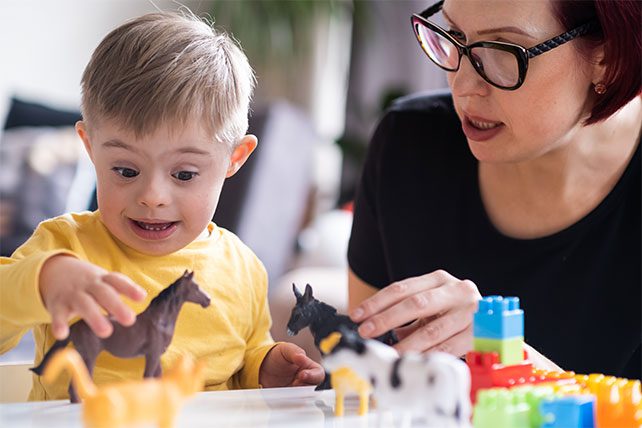Wondering how to interact with children with disabilities in your kidmin program? If you’ve never been around children with special needs or have had limited interactions, you might not feel comfortable or knowledgeable. After all, how do you interact with a child who’s nonverbal? How do you include kids in class activities if they have mobility issues?
Church leaders often ask me these questions. Chances are, you’ve had similar reservations. So let’s talk about four key aspects of disability etiquette. These tips will help you know how to interact with children with disabilities. This is key in children’s ministry, as we strive to share God’s love with all kids!
4 Tips for How To Interact With Children With Disabilities
1. When in doubt, treat them the same as other children that age.
If you work with a 12-year-old who has a disability, don’t treat them like they’re 5 or 6. Here’s a good way to think about it. You know how sometimes we use cute voices when talking to babies or little children? Many people continue to address older kids with disabilities (and even adults!) that same way.
One of my daughters has cerebral palsy. She is 10. I can’t count the times she’s come home and cried, “Why do they treat me like a baby!” I know, and she knows, that people aren’t purposefully being ableists. Still, it hurts her deeply. Think how that could impact a child’s self esteem.
Remember: Even if a child has an intellectual disability, they’ve had the same life experiences as other kids their age. A preteen with an intellectual disability is still going through the challenges of being in middle school. A teen is still going through bodily changes because of hormones. (Yes, they might be dating or have a crush on someone.) So the best rule of thumb? Treat them age-appropriately!
2. Unless parents state otherwise, keep children with disabilities in their age-appropriate group.
I’m sure you’ve heard something like this: “She’s 12, but developmentally she’s more like a 5-year-old.” But a person’s developmental level doesn’t slow down their aging. Do you really want a teenager in a class with elementary school-age children? Probably not. Should a 6-year-old be in a class with toddlers? It might not be safe.
Also consider what such an arrangement communicates to the rest of the congregation and to other children. Plus, it openly and visibly separates the child who has a disability. Attitudes about disability are taught and learned.
We don’t want to teach that people with disabilities are incapable or unable to participate in church. We want to build on all our strengths. And we want to show what the body of Christ looks like, starting with children’s ministry.
My 8-year-old has Down syndrome. I expect her to be with children her age at church, just as she is at school. Yes, she might need extra support. But here’s the beauty of what can happen at church. Sometimes the support comes from her peers, as the body of Christ works together. And sometimes, of course, the support comes from an adult.
If a parent asks you for this arrangement, have a conversation. Present the idea to first try the age-appropriate group. Sometimes parents need guidance, too.

